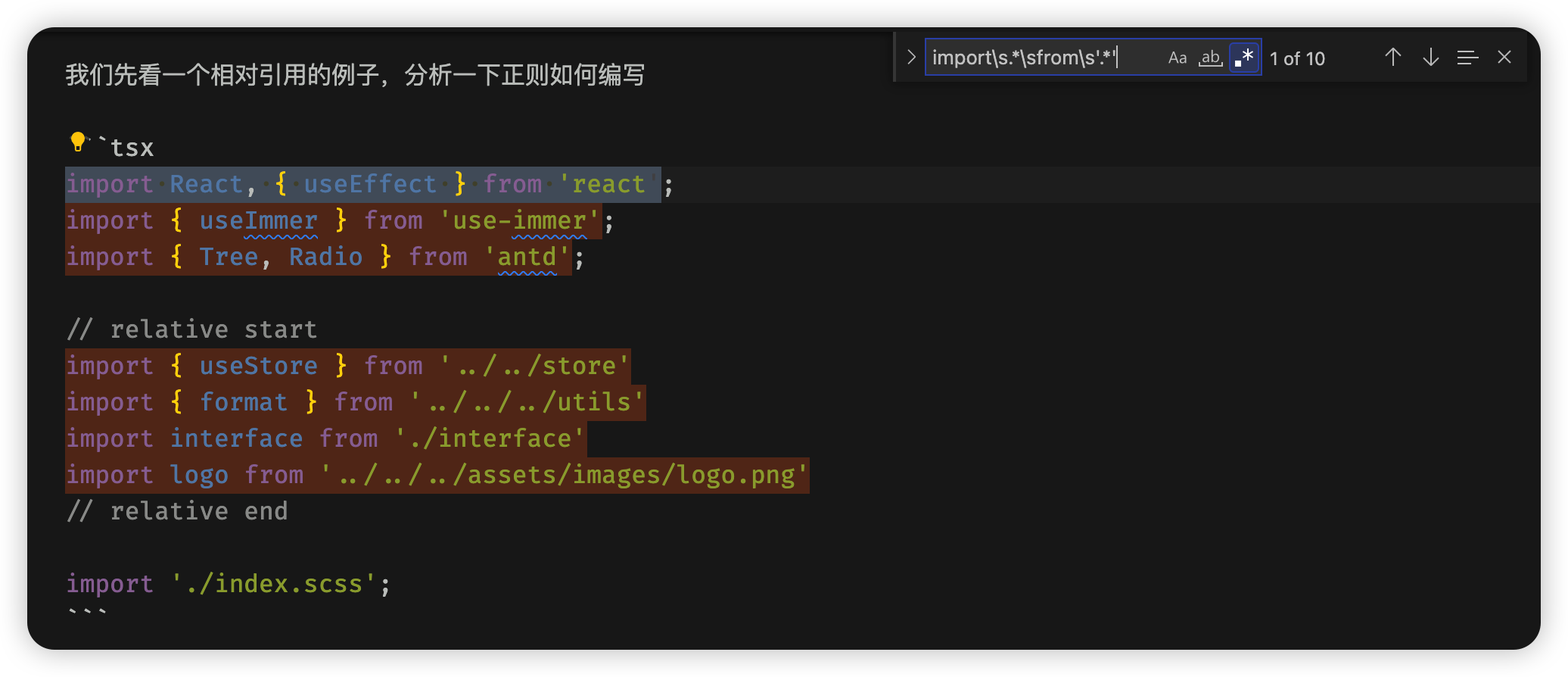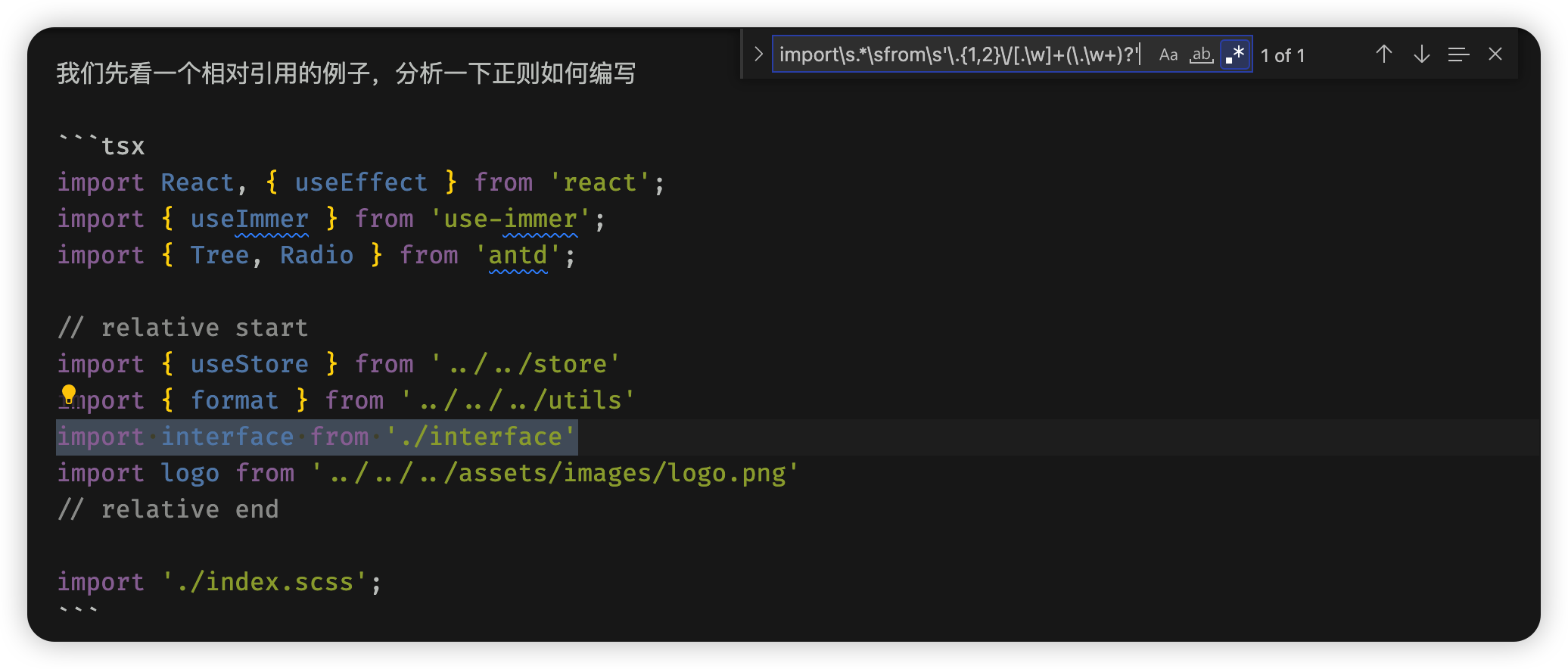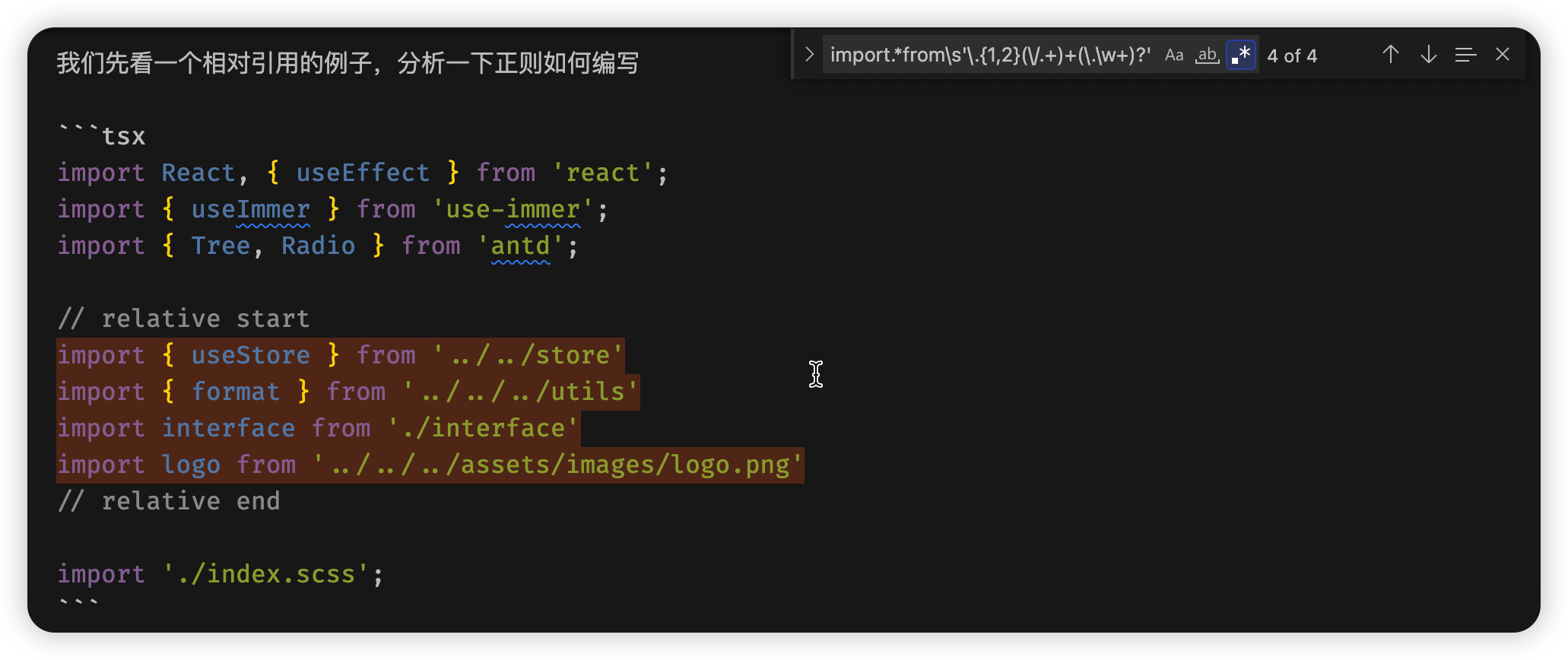 相对路径转别名路径之 chokidar
相对路径转别名路径之 chokidar
# 前言
书接上回 node 监听文件夹并处理
最近各个项目都配置了路径别名,引用文件又方便了不少,而且还摆脱了又臭又长的 ../
代码一下就简洁干净了不少,而且也不用担心拷贝代码以后引用路径错误的问题。
路径别名配置文档可以参考这篇文章:react @craco/craco 配置路径别名 @ 转 src (opens new window)
说个题外话,这里为什么不说移动文件呢?因为移动文件以后,VSCode 可以自动校正引用路径,完全不需要我们管,配置如下
{
// 自动更新路径
"javascript.updateImportsOnFileMove.enabled": "always",
"typescript.updateImportsOnFileMove.enabled": "always"
}
2
3
4
5
书归正传,但有一个很现实的问题:我们以前一直使用的是相对路径,难道要我们手动一个一个改吗?这不是累傻小子吗?
no, no, no
作为程序员,第一美德肯定是懒,这种重复而且不需要动脑子的体力活,怎么适合程序员干呢?那必须是程序干啊!
所以我们需要写一个脚本,可以自动将相对路径转为别名路径
有了新增文件自动初始化的经验,这不是手到擒来嘛
大体思路就是找到需要修改的相对路径,替换为别名路径即可,简单吧~
个屁呀
假设目录树如下:
demo
└─ src
├─ assets
│ └─ images
│ └─ logo.png
├─ pages
│ ├─ Admin
│ │ └─ HelloWorld
│ │ ├─ index.tsx
│ │ └─ interface.js
│ └─ store
│ └─ index.js
└─ utils
└─ index.js
2
3
4
5
6
7
8
9
10
11
12
13
14
当前文件为 HelloWorld/index.tsx
# 如何匹配相对路径
一说到匹配,那当仁不让的就是正则了,没有比他更好的选择了
我们先看一个相对引用的例子,分析一下正则如何编写
import React, { useEffect } from 'react'
import { useImmer } from 'use-immer'
import { Tree, Radio } from 'antd'
// relative start
import { useStore } from '../../store'
import { format } from '../../../utils'
import interface from './interface'
import logo from '../../../assets/images/logo.png'
// relative end
import './index.scss'
2
3
4
5
6
7
8
9
10
11
12
我们将变化的使用 x 替代,就可以得出如下简版的正则:
/import\sxxx\sfrom\s'xxx'/
我们先看第一处 x 的正则如何编写
分两种情况,一种是带 {} 的,一种是不带的,我们需要分开讨论
个屁啊
我直接一个 .* 就搞定了,管你那么多,反正前后有 import 和 from 限制,我管你中间写什么,who care 啊
哦,那我知道了,第二处 x 也可以用这个吧
import React, { useEffect } from 'react'
import { useImmer } from 'use-immer'
import { Tree, Radio } from 'antd'
2
3
你问问这三同意吗?
说到这里了,再说一个题外话
教大家一个写正则的好方法:那就是使用 VSCode 的正则查找模式
首先使用 ctrl/cmd + f 打开查找模式,点击正则匹配图标即可,当然也可以直接通过快捷键打开正则查找模式

如上图,我配置的快捷键是 cmd + shift + r
然后在输入框输入正则表达式即可(不用输入 //),这样当你输入的正则表达式可以匹配到当前文件的内容(需要提前写好测试内容)时,查找模式就会高亮匹配到文本,就可以验证正则是否正确了
比如我们现在输入 import\s.*\sfrom\s'.*' 看看能匹配到什么呢?

可以看到,不仅相对引用高亮了,那些第三方引用也高亮了,这肯定是不对的
所以我们需要重点分析一下这部分
首先都是以 . 或 .. 开头,跟着一个或多个 /.. 或者 /\w+,可能还有一个后缀名 \.\w+
对应的正则就是:\.{1,2}\/[.\w]+(\.\w+)?
我们先测试一下:

发现只匹配到一个相对路径,重新检查一下
跟着一个或多个 /.. 或者 /\w+ 我们的正则是 \/[.\w]+,这其实只能匹配到一个,所以我们需要变成可以匹配多个的:(\/[.\w]+)+
再试试:

可以了,正好是我们需要的,完整的正则如下:
import\s.*\sfrom\s'\.{1,2}(\/[.\w]+)+(\.\w+)?'
可以进行下一步了~
等等,这个正则你不觉得有点长吗?
正则都是非常长,而且还晦涩难懂(小声 BB:我到现在还有点懵呢),都正常的啦~
作为一个专业的程序员,我们必须力求精简,即使是正则也不例外,不能因为不懂或阴差阳错写出来就万事大吉了
首先还是看第一处 x,这里我们的正则是 \s.*\s,但其实 . 就包含了 \s,所以我们使用 .* 就可以了
再看第二处,\.{1,2} 和 (\.\w+)? 无法优化了,但 (\/[.\w]+)+ 还是可以优化嘀,[.\w]+ 也可以使用 . 代替
那最后就是 import.*from\s'\.{1,2}(\/.+)+(\.\w+)?'
再验证一下:

完全没问题,可以进行下一步啦~
# 如何获取相对路径
现在正则有了,直接使用 replace 替换就可以了
测试一下:
const str = `
import React, { useEffect } from 'react'
import { useImmer } from 'use-immer'
import { Tree, Radio } from 'antd'
// relative start
import { useStore } from '../../store'
import { format } from '../../../utils'
import interface from './interface'
import logo from '../../../assets/images/logo.png'
// relative end
import './index.scss'
`
const reg = /import.*from\s'\.{1,2}(\/.+)+(\.\w+)?'/g
str.replace(reg, function (match, p1, p2) {
console.log('match:', match, 'p1:', p1, 'p2:', p2)
})
2
3
4
5
6
7
8
9
10
11
12
13
14
15
16
17
18
19
20
输出如下:
match: import { useStore } from '../../store' p1: /../store p2: undefined
match: import { format } from '../../../utils' p1: /../../utils p2: undefined
match: import interface from './interface' p1: /interface p2: undefined
match: import logo from '../../../assets/images/logo.png' p1: /../../assets/images/logo.png p2: undefined
2
3
4
这个输出有点超出我的预期范围了,感觉不对!
首先 match 匹配是对的,但我们好像没有特意写子表达式(正则中用括号括起来的那些)啊
原来我们在优化时无意识的写了子表达式:(\/.+)+(\.\w+)?,当时只是为了匹配多个
但这貌似应该是两个子表达式吧,别的就不说了,import logo from '../../../assets/images/logo.png' 中 .png 应该被 p2 匹配到啊
结果却被 p1 匹配到了,说明正则还是有问题
这种匹配长度超出我们预期的现象,大部分都是因为处于贪婪匹配模式,会尽可能的多匹配符合正则的字符
解决方法也很简单,在量词后面加一个 ? 就变成非贪婪模式了
以我们这个为例,\/.+ 其实就已经把后面的字符都匹配完了,其实就是 import.*from\s'\.{1,2}(\/.+)'
再测试一下:
const reg = /import.*from\s'\.{1,2}(\/.+)'/g
str.replace(reg, function (match, p1, p2) {
console.log('match:', match, 'p1:', p1, 'p2:', p2)
})
2
3
4
5
输出如下:
match: import { useStore } from '../../store' p1: /../store p2: 133
match: import { format } from '../../../utils' p1: /../../utils p2: 172
match: import interface from './interface' p1: /interface p2: 212
match: import logo from '../../../assets/images/logo.png' p1: /../../assets/images/logo.png p2: 248
2
3
4
match 和 p1 与原来相同,所有此次优化又成功啦~
p2 是因为我们本次正则就只有一个子表达式,p2 就变成 offset: 匹配到的子字符串在原字符串中的偏移量
我们再验证一下非贪婪模式:import.*from\s'\.{1,2}(\/.+?)(\.\w+)?'
再测试一下:
const reg = /import.*from\s'\.{1,2}(\/.+?)(\.\w+)?'/g
str.replace(reg, function (match, p1, p2) {
console.log('match:', match, 'p1:', p1, 'p2:', p2)
})
2
3
4
5
输出如下:
match: import { useStore } from '../../store' p1: /../store p2: undefined
match: import { format } from '../../../utils' p1: /../../utils p2: undefined
match: import interface from './interface' p1: /interface p2: undefined
match: import logo from '../../../assets/images/logo.png' p1: /../../assets/images/logo p2: .png
2
3
4
好,完全正确!
但其实 import.*from\s'\.{1,2}(\/.+)' 已经就满足我们的需求了,只是还缺少前面一层路径,使用括号创建一个子表达式就可以了:import.*from\s'(\.{1,2}\/.+)'
再测试一下:
const reg = /import.*from\s'(\.{1,2}\/.+)'/g
str.replace(reg, function (match, p1, p2) {
console.log('match:', match, 'p1:', p1, 'p2:', p2)
})
2
3
4
5
输出如下:
match: import { useStore } from '../../store' p1: ../../store p2: 133
match: import { format } from '../../../utils' p1: ../../../utils p2: 172
match: import interface from './interface' p1: ./interface p2: 212
match: import logo from '../../../assets/images/logo.png' p1: ../../../assets/images/logo.png p2: 248
2
3
4
p1 就是我们需要替换的字符
# 相对路径如何转别名路径
这里我们主要解决 import { format } from '../../../utils' 转成 import { format } from '@/utils'
../../../utils 我们已经找到了,如何变成 @/utils 就是我们需要做的了
在上一章我们使用 relative 来根据当前工作目录查找从给定路径到另一个路径的相对路径,那么有没有相反的函数呢?
当然是有的,那就是 normalize (opens new window)
可以看一下官网的例子:
path.normalize('/foo/bar//baz/asdf/quux/..')
// Returns: '/foo/bar/baz/asdf'
2
看到参数有什么想法吗?
对,我们只需要把当前文件的路径及相对路径 join 一下,然后当参数传给 normalize 就可以生成当前引用的绝对路径了
再根据 src/ 截取一下,拼上 @ 不就可以了吗?
我们来实现一下:
const path = require('path')
const fs = require('fs')
const filePath = path.join(__dirname, 'src/pages/Admin/HelloWorld/index.tsx')
const fileData = fs.readFileSync(filePath, 'utf8')
const reg = /import.*from\s'(\.{1,2}\/.+)'/g
fileData.replace(reg, function (match, p1) {
const absolutePath = path.normalize(path.join(filePath, p1))
console.log(absolutePath)
})
2
3
4
5
6
7
8
9
10
11
12
13
输出:
demo\src\pages\Admin\store
demo\src\pages\utils
demo\src\pages\Admin\HelloWorld\index.tsx\interface
demo\src\pages\assets\images\logo.png
2
3
4
路径有点问题,../ 多了一个 pages,./ 多了一个 index.tsx
看来 normalize 使用还有点问题
再看一下例子,貌似好像不需要最后面的 index.tsx
去掉试试
const path = require('path')
const fs = require('fs')
const filePath = path.join(__dirname, 'src/pages/Admin/HelloWorld/index.tsx')
const fileData = fs.readFileSync(filePath, 'utf8')
const reg = /import.*from\s'(\.{1,2}\/.+)'/g
fileData.replace(reg, function (match, p1) {
const absolutePath = path.normalize(path.join(path.parse(filePath).dir, p1))
console.log(absolutePath)
})
2
3
4
5
6
7
8
9
10
11
12
13
输出:
demo\src\pages\store
demo\src\utils
demo\src\pages\Admin\HelloWorld\interface
demo\src\assets\images\logo.png
2
3
4
绝对路径没有问题了,再变成别名路径:
const path = require('path')
const fs = require('fs')
const sep = path.sep
const filePath = path.join(__dirname, 'src/pages/Admin/HelloWorld/index.tsx')
const fileData = fs.readFileSync(filePath, 'utf8')
const reg = /import.*from\s'(\.{1,2}\/.+)'/g
fileData.replace(reg, function (match, p1) {
const absolutePath = path.normalize(path.join(path.parse(filePath).dir, p1))
const aliasPath = '@/' + absolutePath.split(`src${sep}`)[1].replace(/\\/g, '/')
console.log(aliasPath)
})
2
3
4
5
6
7
8
9
10
11
12
13
14
15
16
输出:
@/pages/store
@/utils
@/pages/Admin/HelloWorld/interface
@/assets/images/logo.png
2
3
4
别名路径也没问题了
那就执行替换吧
const result = fileData.replace(reg, function (match, p1, p2) {
const absolutePath = path.normalize(path.join(path.parse(filePath).dir, p1))
const aliasPath = '@/' + absolutePath.split(`src${sep}`)[1].replace(/\\/g, '/')
return aliasPath
})
console.log(result)
2
3
4
5
6
输出:
import React, { useEffect } from 'react'
import { useImmer } from 'use-immer'
import { Tree, Radio } from 'antd'
// relative start
@/pages/store
@/utils
@/pages/Admin/HelloWorld/interface
@/assets/images/logo.png
// relative end
import './index.scss'
2
3
4
5
6
7
8
9
10
11
12
嗯?怎么回事,我那么大一个 import 哪去了?
原来搞错了呀,这里我们使用转换以后的 p1 替换 match,导致丢失了前面的字符
有两种方式,
一种是把前面的也变成子表达式,最后返回两个子表达式:
const reg = /(import.*from\s)'(\.{1,2}\/.+)'/g
const result = fileData.replace(reg, function (match, p1, p2) {
const absolutePath = path.normalize(path.join(path.parse(filePath).dir, p2))
const aliasPath = '@/' + absolutePath.split(`src${sep}`)[1].replace(/\\/g, '/')
return `${p1}'${aliasPath}'`
})
console.log(result)
2
3
4
5
6
7
8
输出:
import React, { useEffect } from 'react'
import { useImmer } from 'use-immer'
import { Tree, Radio } from 'antd'
// relative start
import { useStore } from '@/pages/store'
import { format } from '@/utils'
import interface from '@/pages/Admin/HelloWorld/interface'
import logo from '@/assets/images/logo.png'
// relative end
import './index.scss'
2
3
4
5
6
7
8
9
10
11
12
完美!
另一种是正则只匹配相对路径的引用部分:
const reg = /\.{1,2}\/.+/g
const result = fileData.replace(reg, function (match, p1, p2) {
const absolutePath = path.normalize(path.join(path.parse(filePath).dir, match))
const aliasPath = '@/' + absolutePath.split(`src${sep}`)[1].replace(/\\/g, '/')
return aliasPath
})
console.log(result)
2
3
4
5
6
7
8
输出:
import React, { useEffect } from 'react'
import { useImmer } from 'use-immer'
import { Tree, Radio } from 'antd'
// relative start
import { useStore } from '@/pages/store'
import { format } from '@/utils'
import interface from '@/pages/Admin/HelloWorld/interface'
import logo from '@/assets/images/logo.png'
// relative end
import '@/pages/Admin/HelloWorld/index.scss'
2
3
4
5
6
7
8
9
10
11
12
这种是把所有 ./ 或 ../ 开头的字符都匹配了,感觉有点不可控,还是使用第一种方式吧
# 在实际项目中验证
本来一开始测试的都运行完美,结果遇到下面的代码:
import {
format,
formatDate,
formatTime,
isObject,
isArray,
getCookie,
listToTree
} from '../../../utils'
2
3
4
5
6
7
8
9
发现匹配不了了,这种在项目中还是很常见的,必须要解决的
这是因为 import.* 中的 . 只能匹配除换行符 "\n" 外的任意字符,所以这里还需要加上换行的正则
我们可以使用 [\s\S] 来替换 .,这样就可以匹配任意字符啦
const reg = /(import[\s\S]*from\s)'(\.{1,2}\/.+)'/g
const result = fileData.replace(reg, function (match, p1, p2) {
console.log('p1:', p1, 'p2:', p2)
const absolutePath = path.normalize(path.join(path.parse(filePath).dir, p2))
const aliasPath = '@/' + absolutePath.split(`src${sep}`)[1].replace(/\\/g, '/')
return `${p1}'${aliasPath}'`
})
2
3
4
5
6
7
8
输出:
p1: import React, { useEffect } from 'react'
import { useImmer } from 'use-immer'
import { Tree, Radio } from 'antd'
// relative start
import { useStore } from '../../store'
import {
format,
formatDate,
formatTime,
isObject,
isArray,
getCookie,
listToTree
} from '../../../utils'
import interface from './interface'
import logo from p2: ../../../assets/images/logo.png
2
3
4
5
6
7
8
9
10
11
12
13
14
15
16
17
看到这个输出,应该知道为啥了吧,又是贪婪匹配了,这就好办了
const reg = /(import[\s\S]*?from\s)'(\.{1,2}\/.+)'/g
const result = fileData.replace(reg, function (match, p1, p2) {
const absolutePath = path.normalize(path.join(path.parse(filePath).dir, p2))
const aliasPath = '@/' + absolutePath.split(`src${sep}`)[1].replace(/\\/g, '/')
return `${p1}'${aliasPath}'`
})
console.log(result)
2
3
4
5
6
7
8
输出:
import React, { useEffect } from 'react'
import { useImmer } from 'use-immer'
import { Tree, Radio } from 'antd'
// relative start
import { useStore } from '@/pages/store'
import {
format,
formatDate,
formatTime,
isObject,
isArray,
getCookie,
listToTree
} from '@/utils'
import interface from '@/pages/Admin/HelloWorld/interface'
import logo from '@/assets/images/logo.png'
// relative end
import './index.scss'
2
3
4
5
6
7
8
9
10
11
12
13
14
15
16
17
18
19
20
完美~
我们只需要使用 fs.writeFileSync(filePath, result) 重新写入就可以啦
# 使用 chokidar 监听文件并处理
处理脚本有了,现在就差如何触发了
既然已经使用 chokidar 监听了,就还使用它吧
add 和 addDir 是不行了,只能使用 change 事件监听了
我们继续使用链式调用:
const reg = /(import[\s\S]*?from\s)'(\.{1,2}\/.+)'/g
// do something: watch add/addDir
.on('change', filePath => {
let fileData = readFileSync(filePath, 'utf8')
if (reg.test(fileData)) {
const result = fileData.replace(reg, (match, p1, p2) => {
const absolutePath = path.normalize(path.join(path.parse(filePath).dir, p2))
const aliasPath = '@/' + absolutePath.split(`src${sep}`)[1].replace(/\\/g, '/')
return `${p1}'${aliasPath}'`
})
fs.writeFileSync(filePath, result)
}
})
2
3
4
5
6
7
8
9
10
11
12
13
14
15
这样,当我们启动项目,更改文件并保存后,就会触发脚本,自动将相对路径转为别名路径
由于我们项目在保存文件时,自动执行了格式化,导致有时候与自动格式化冲突,路径没有转换成功,故使用 setTimeout 延迟一下:
setTimeout(() => {
fs.writeFileSync(filePath, result)
}, 100)
2
3
而且好像不用修改文件,直接使用快捷键保存也可以触发
# 发现的问题
# 性能问题
首先 change 事件是在保存文件时触发,而我们转换路径一般只调用一次就够了,后续的 change 事件均无效了
所以我们在第一次触发 change 事件后,就需要 unwatch 该文件
const watcher = chokidar.watch('./src', {
ignoreInitial: true
})
watcher.on('change', filePath => {
watcher.unwatch(filePath)
let fileData = readFileSync(filePath, 'utf8')
if (reg.test(fileData)) {
const result = fileData.replace(reg, (match, p1, p2) => {
const absolutePath = path.normalize(path.join(path.parse(filePath).dir, p2))
const aliasPath = '@/' + absolutePath.split(`src${sep}`)[1].replace(/\\/g, '/')
return `${p1}'${aliasPath}'`
})
setTimeout(() => {
fs.writeFileSync(filePath, result)
}, 100)
}
})
2
3
4
5
6
7
8
9
10
11
12
13
14
15
16
17
# 触发时机不好控制
目前的触发时机是开启服务并且文件改变,完全不受使用者控制
比如开着服务切换分支时,某些文件会发生改变,就会触发脚本,大量文件被修改
或者某些文件不想转换路径,也被自动执行了,虽然加了 unwatch,可以再撤回就不会自动转了,但还是使用不太方便
所以我们需要做一个可以由使用者控制的脚本
这个使用 chokidar 就无法做到了,只能使用 VSCode 插件实现了
详细实现逻辑见:VSCode 开发插件之相对路径转别名路径